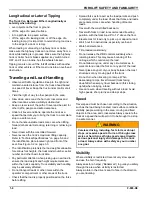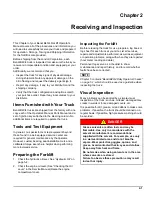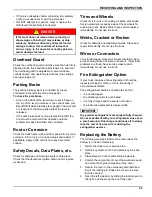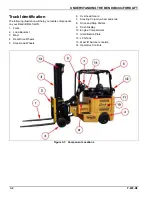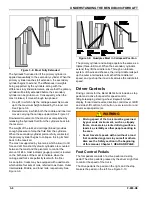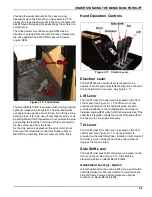
3-6
F-808-R0
UNDERSTANDING THE BENDI B40I4 FORKLIFT
Satety Interlock
Both a key lock switch (Keyswitch) and an operator’s seat
switch must be engaged before the truck can move. The
seat switch is activated when the operator is seated in
the driver’s seat. See “Seat Safety Switch” on page 1-6
for additional information.
Battery
A 12-volt lead acid battery provides electrical power for
the engine, lights, and other auxiliary equipment. For
maintenance and/or emergencies, turn off the key switch
to stop power to the truck.
For maintenance, the driver's seat compartment cover
and a hinged side cover, provides easy access to the
engine compartment where the battery is located.
Hydraulic System
The hydraulic system consists of two separate circuits
driven by a through shaft system originating at the pump
drive attached to the flywheel on the engine. The first of
these circuits is the hydrostatic drive and the second is
the auxiliary pump circuit.
Hydrostatic Drive
The hydrostatic drive is comprised of a variable
displacement pump plumbed to a fixed displacement
motor for each of the two drive wheels all controlled by
the Vehicle Master Controller (VMC). The operator sends
a direction and throttle signal to the VMC via the
operator's controls. The VMC in-turn sends a throttle
signal to the engine control module and a command to
the variable displacement pump. This pump then sends
oil at pressure to the wheel motors. The wheel motors
then rotate the drive tires with speed and torque. Refer to
the VMC section of the Service Manual for additional
information and calibration instruction and procedures.
Auxiliary Pump Circuit
The auxiliary pump is located on the front of the variable
displacement pump. The auxiliary pump provides oil
pressure to the Steering, Hydraulic Fan and Mast Valve.
Steering
Steering is controlled by the steering control valve, or
orbital, metering oil supplied by the auxiliary pump based
on the operator's input to the steering wheel. Pressurized
oil from the steering control valve is sent through a
motion control valve to the hydraulic steering motor. This
motor turns actuator, which rotates the front plate and
mast.
Hydraulic Fan
The oil flow to the hydraulic fan is regulated by a
proportional valve controlled by the VMC. The fan speed
is controlled by varying the oil flow based on engine
temperature. As engine temperature rises, the fan speed
will increase to match the greater cooling demand.
Consequently, the hydraulic fan is shut off when full mast
lift is commanded to allow all hydraulic fluid flow to the
mast.
Mast Valve
Oil supplied by the auxiliary pump, not used by steering
or the hydraulic fan is directed to the 3-spool mast control
valve. An inlet relief controls pressure in this branch of
the auxiliary pump circuit. The 3-spool valve directs lift
circuit pressurized oil to the lift, tilt, and side shift
functions based on the operator's shifting of the valve
levers. In the event that an attachment or 4th function is
added, oil from the side shift spool is split to go either to
the side shift cylinders or the 4th function based on the
signal from a push-button switch mounted to the spool
control lever.
Filtration and Cooling
Return oil from the steering function, hydraulic fan and lift
function are combined at the filter manifold and sent
through the hydraulic cooler to be cooled. Cooled oil from
the hydraulic oil cooler is then sent through the in-tank
hydraulic oil filter.
The following sections briefly describe how each of the
hydraulic functions operate:
Mast Controls
Mast positioning is achieved by operating the
proportional control valve via the mast control lever.
Hydraulic pressure is provided by the secondary pump.
Mast movements may be operated individually or
together, however, when operated together, the speed of
operation is somewhat limited.
Mast Lift
The mast lift circuit provides the means for lifting and
lowering the mast and fork assembly. The mast lift
consists of three hydraulic cylinders - one primary and
two secondary, a velocity fuse and a flow regulator.
Summary of Contents for Bendi B40i4
Page 2: ......
Page 12: ...1 4 F 808 R0 FORKLIFT SAFETY AND FAMILIARITY Figure 1 2 Decals...
Page 18: ...1 10 F 808 R0 FORKLIFT SAFETY AND FAMILIARITY Table provided for general use NOTES...
Page 24: ...2 6 F 808 R0 RECEIVING AND INSPECTION Table provided for general use NOTES...
Page 54: ...4 16 F 808 R0 OPERATING THE B40I4 FORKLIFT Table provided for general use NOTES...
Page 62: ...5 8 F 808 R0 Figure 5 5 Lubrication Points...
Page 64: ...5 10 F 808 R0 Table provided for general use NOTES...

